The recent rough winter season – one of the coldest in the U.S. and resulting in the 10th largest snow cover in the Lower 48 states, dating to 1966, according to the Rutgers University Snow Lab – often scrambled much of the country’s freight transportation network. But such “supply chain disruptions” due to weather or other factors are also now being viewed as ripe targets of opportunity for cargo thieves.
“What we’re finding is that when the supply chain gets disrupted such as by a massive blizzard or say a port worker strike, a lot of transportation companies being doing things outside of their normal ‘safe’ practices due to excessive shipment backlogs, etc.,” Sam Rizitelli, national director for transportation at Travelers Inland Marine division, explained to Fleet Owner.
“During ‘disruptive’ events, there’s confusion and companies are often shorthanded – especially if it’s a weather event,” he added. “Things begin to back up, there’s chaos, and so the normal procedures for handling freight get put aside. That creates an opportunity we see more cargo thieves trying to exploit.”
Scott Cornell, director of the Specialty Investigations Group (SIG) within the Inland Marine division at Travelers, used a Hurricane-induced port closure to illustrate this issue.
“When the port closes, now you have cargo container ships offshore that can’t unload; cargo within the port than can’t get moved; and trucks inbound to the port parked at truck stops, rest areas, and other locations unable to deliver their shipments,” he said. “All this freight – particularly on the trucks – is now idle and exposed, often in unsecured locations. It’s got nowhere to go and thus creates a ‘buffet’ of cargo for thieves to choose from.”
Cornell added that once the storm passes and the port reopens, all of that delayed cargo must now get moved – and moved quickly. “Now all of this cargo has to get pushed into and out of the port at a faster rate, again leading to another ‘buffet’ style situation as the focus is on speed and not necessarily proper security procedures,” he explained.
The upshot, Rizitelli noted, is that carriers and shippers alike must learn never to lower their guard where cargo in transit is concerned – but that especially goes double when transportation networks get “unsettled” by weather and other disruptive events. “In a way, it’s like football: who owns the clock owns the game,” he explained.
Yet Walt Fountain, safety and enterprise security director for TL carrier Schneider National, stressed that cargo thieves are just taking advantage of the “vulnerabilities” presented by carriers and shippers alike.
“For example, if our industry continues to solicit bids for loads on open websites – and then broker loads with little or no vetting of the potential carrier – absolutely the thieves will continue to determine ways to misdirect legitimate freight operations to their advantage,” he explained.
“Should we be surprised when a thief takes advantage of a situation where [some] contract with an unknown, or unverified, company to move loads in a tight capacity market? I think not,” Fountain added. “Recognizing our own vulnerabilities and then committing to mitigating their risk is our approach to security and safety.”
About the Author
Sean Kilcarr
Editor in Chief
Sean Kilcarr is a former longtime FleetOwner senior editor who wrote for the publication from 2000 to 2018. He served as editor-in-chief from 2017 to 2018.
